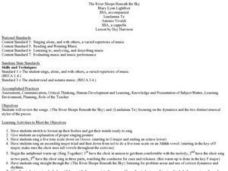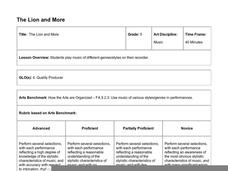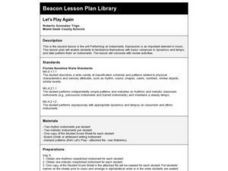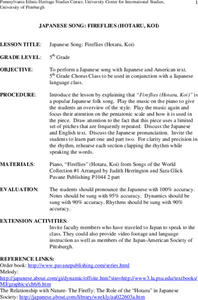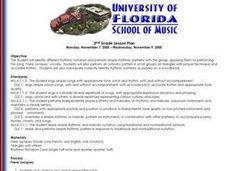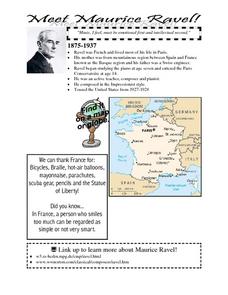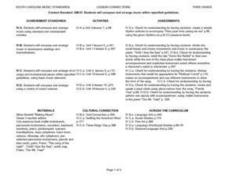Hawaiʻi State Department of Education
Machines
What do science and dance have in common? Simple machines, work, and force! First, children discuss machines, wheels, inclined planes, and wedges. They create inclined planes with their bodies and make up dances about wheels and wedges....
Curated OER
"Mambo" from West Side Story by Leonard Bernstein
Students encounter and study "Mambo" from "West Side Story," by Leonard Bernstein. They practice utilizing musical elements (instrumentation, tempo, and dynamics) to create a certain mood for a scene with music. Each student interprets...
Hawaiʻi State Department of Education
Suki's Kimono
In the story Suki's Kimono drums are used to show mood. Learners discuss mood in the story after they practice playing a simple 4/4 rhythm on their drums. Each group plays the rhythm using a different tempo. They listen to each...
Curated OER
The River Sleeps Beneath The Sky
Students practice singing "The River Sleeps Beneath the Sky" by Mary Lynn Lightfoot and "Laudamus Te" by Antonio Vivaldi in an SSA choir setting in this Choral lesson for High Schoolers. Emphasis is placed on National Standards for Music...
Hawaiʻi State Department of Education
The Lion and More
Melody, rhythm, tempo, and dynamics; get out those recorders it's time to play music! Your class will work on playing two lion-themed pieces that exemplify two different styles, folk and waltz. They'll discuss the elements of music and...
San Francisco Symphony
Aaron Copland: Billy the Kid
Your class can think about the American Old West as they listen for dynamics, articulation, rhythm, and tempo in the Aaron Copland song, "Billy The Kid." They'll explore how Copland uses music to create an image of life for an outlaw in...
San Francisco Symphony
Quilt Making and Copland's Rodeo
Kids make quilts as they learn about pioneer life and the concept of tempo. The Aaron Copland piece, Rodeo is used to convey rhythm and tempo in music. As the children discuss tempo and rhythm, they also discuss what life was like for...
Curated OER
Characteristics of the Classical Period
In this music worksheet, students identify the specific characteristics of the Classical Period in music. They define seven key terms related to the period and who the composers were of that time period.
Curated OER
Let's Play Again
First graders use rhythm instruments to explore dynamic fluctuations in music. They experiment with clapping, body movement, recorded music and pitch instruments to explore the concept of tempo.
Curated OER
Japanese Song: Fireflies (Hotaru, Koi)
Fifth graders examine the lyrics of a popular Japanese folk song to focus on the pentatonic scale and how it is used in the musical piece. English and Japnanese pronunciations are practiced in this instructional activity.
Curated OER
No Title
Third graders assess how to read and write rhythmic notation in music. They explore the concepts of whole, half, quarter, eighth, dotted lines, extended pentatonic, diatonic and major/minor modes. Symbols along with additional...
Curated OER
VH1 200 Greatest Pop Culture Icons Lesson 2
Students examine the origins of ragtime music in American and analyze its musical form.
Curated OER
Frere Jacgues
Second graders identify different rhythmic notation and perform simple rhythmic patterns with the group, applying them to performing the song "Frere Jacques" vocally. Emphasis is placed on meeting State and National Standards for the Arts.
Curated OER
Taking it to the Streets
Students explain the concept of cultural diffusion. They give examples of cultural diffusion throughout history; e.g. the development of Cuban music and dance. Students explain how cultural diffusion impacts civilizations, past and...
Curated OER
Instrumental Rehearsals for Excellence - Lesson 3
Students identify some characteristics of successful music teachers and rehearsals. They develop a list of criteria for evaluating the quality of a performance, and apply those criteria to a specific performance.
Curated OER
Balance, Rhythmns and Stomp Rockets
Students practice stepping and jumping, using specified foot action, in rhythm. In groups, they practice jumping onto stomp rocket launchers and demonstrate how to increase the distance by raising the angle of the launcher. After each...
Curated OER
Found Poem - Found Song
In this Louisiana music worksheet, students learn that a found poem is made using words and phrases from some things they have read and, then write a found poem following the steps listed on the worksheet.
Curated OER
Music: Individual and Group Practice
Third graders, in groups and individually, perform various musical pieces on their instruments. After demonstrating how to play steady beats, they also play counter melodies to songs such as "Peace Like a River." While some students...
Hawaiʻi State Department of Education
Beethoven’s 5th
Time to pick up an instrument and practice the first part of Beethoven's symphony No.5. Young musicians discuss melody, rhythmic pattern, dynamics, and movements found in symphonic and orchestral pieces. They then practice and play the...
Curated OER
'Cross the Wide Missouri
Students perform a song, identify melodies, and discuss the history of folk songs.
Curated OER
Pavane pour une Infante Defunte
Students describe the music in terms related to basic elements such as melody, rhythm, harmony, dynamics, timbre, form, style, etc. They identify timbres heard in "Pavane" by movement and respond by movement to timbre.
Curated OER
Teaching Dynamics
Second graders discuss the sounds of rainstorms. In this rainstorm lesson, 2nd graders listen to the story Down Comes the Rain and they discuss the change in sounds they hear in a thunder storm. They use percussion instruments to create...
Curated OER
Allegro Band Warm-Up & Joyance rehearsal
In need of a high school band instructional activity? This resource includes a warm up, objectives for learners to focus on, and notes for each part of the song being played. These notes are specific to the learners it is written for,...
Curated OER
Lesson Connections
Third graders sing alone, with others and practice a varied repertoire of music. They have to sing using appropriate timbre, diction, and pesture, all while maintaining a steady tempo. Singly expressively, with appropriate dynamics,...



